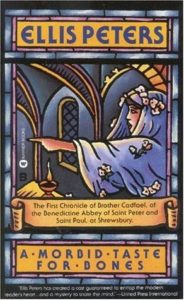Cozy up in your own home with your choice of beverage and snack for the Lopez Library’s virtual Cozy Mystery Book Club. The next book we’ll be discussing is a medieval cozy, the first in the award-winning Brother Cadfael Mystery Series, A Morbid Taste for Bones, by Ellis Peters.
The club will meet on Wednesday, June 24th at 6:30pm over Zoom.
The e-book is available on Hoopla (no waiting) and Overdrive/Libby as an e-book. Please contact us if you need help accessing these materials: beth@lopezlibrary.org.
 A Welsh Benedictine monk living at Shrewsbury Abbey in western England, Brother Cadfael spends much of his time tending the herbs and vegetables in the garden—but now there’s a more pressing matter. Cadfael is to serve as translator for a group of monks heading to the town of Gwytherin in Wales. The team’s goal is to collect the holy remains of Saint Winifred, which Prior Robert hopes will boost the abbey’s reputation, as well as his own. But when the monks arrive in Gwytherin, the town is divided over the request.
A Welsh Benedictine monk living at Shrewsbury Abbey in western England, Brother Cadfael spends much of his time tending the herbs and vegetables in the garden—but now there’s a more pressing matter. Cadfael is to serve as translator for a group of monks heading to the town of Gwytherin in Wales. The team’s goal is to collect the holy remains of Saint Winifred, which Prior Robert hopes will boost the abbey’s reputation, as well as his own. But when the monks arrive in Gwytherin, the town is divided over the request.
When the leading opponent to disturbing the grave is found shot dead with a mysterious arrow, some believe Saint Winifred herself delivered the deadly blow. Brother Cadfael knows an earthly hand did the deed, but his plan to root out a murderer may dig up more than he can handle.
Before CSI and Law & Order, there was Brother Cadfael, “wily veteran of the Crusades” (Los Angeles Times). His knowledge of herbalism, picked up in the Holy Land, and his skillful observance of human nature are blessings in dire situations, and earned Ellis Peters a Crime Writers’ Association Silver Dagger Award. A Morbid Taste for Bones kicks off a long-running and much-loved series that went on to be adapted for stage, radio, and television.
What’s a ‘Cozy?’ No, not that thing you put on your teapot. In the mystery world, a cozy is a traditional whodunit where the focus is on an amateur sleuth in a small community. This kind of mystery is distinguished by what it doesn’t have―no graphic violence, intimacy, or language―the emphasis is on the clues and characters.
If you are interested, please see the Discussion Questions below (may contain spoilers).
Zoom link and information – you should be able to just click on the link below using a computer to join, but can also join with a phone. Please contact us if you need help (beth@lopezlibrary.org):
Join Zoom Meeting
https://us02web.zoom.us/j/86380931348?pwd=dFVCVy9PVmJyaytzQkFka2phUWZZUT09
Meeting ID: 863 8093 1348
Password: 545092
One tap mobile
+12532158782,,86380931348#,,1#,545092# US (Tacoma)
+13462487799,,86380931348#,,1#,545092# US (Houston)
Dial by your location
+1 253 215 8782 US (Tacoma)
+1 346 248 7799 US (Houston)
+1 669 900 6833 US (San Jose)
+1 312 626 6799 US (Chicago)
+1 929 205 6099 US (New York)
+1 301 715 8592 US (Germantown)
Meeting ID: 863 8093 1348
Password: 545092
Find your local number: https://us02web.zoom.us/u/kALWskNGi
Discussion Questions
By Miki Wolfe for the Southeastern Mass. Reader’s Advisory Roundtable, Feb. 3, 2015
1) Writer Edith Pargeter (pen named Ellis Peters) was a linguist and scholar, and her books are considered to be historically accurate (with allowances to be made for readability.) Even the abbots of the Shrewsbury Abbey are real people, and actually in order of history (Prior Robert succeeds as abbot soon after the end of the series in 1148.) How much did you learn from this book about life in the 12th century?
2) Are you comfortable with the compromises the writer used in order to make the 12th century English/Wales setting more palatable to modern readers? (Examples: dialogue, language, age of characters, social customs- sanitation; Benedictine monks required to lower their gaze in the presence of women)
3) How believable was Brother Cadfael as a Renaissance type of man (before the advent of the Renaissance, that is?) Herbalist, detective, matchmaker, veteran soldier, Brother Cadfael does a little of everything, with a modern view on women to boot. How much do you think the writer compromised historical accuracy in order to create a sympathetic character? Did it detract from the book at all for you?
4) Cadfael is a traditional Welsh name, meaning “battle” (cad) and “prince” (mael). How does knowing this shed light on his character, and allow the reader more insight into his nature?
5) One critic referred to this book as “enjoyable historical candy”. Discuss.
6) What was your feeling at the end of the novel, as all the loose ends of the mystery were wound up quite neatly? Was justice truly served?
7) What was your feeling on the treatment of religion in this book, from the pious practicality of Prior Robert to the feigned ecstasies of Columbanus?
8) Anyone familiar with the Derek Jacobi TV series? How did you find this compared? (Season 2, Episode 3)